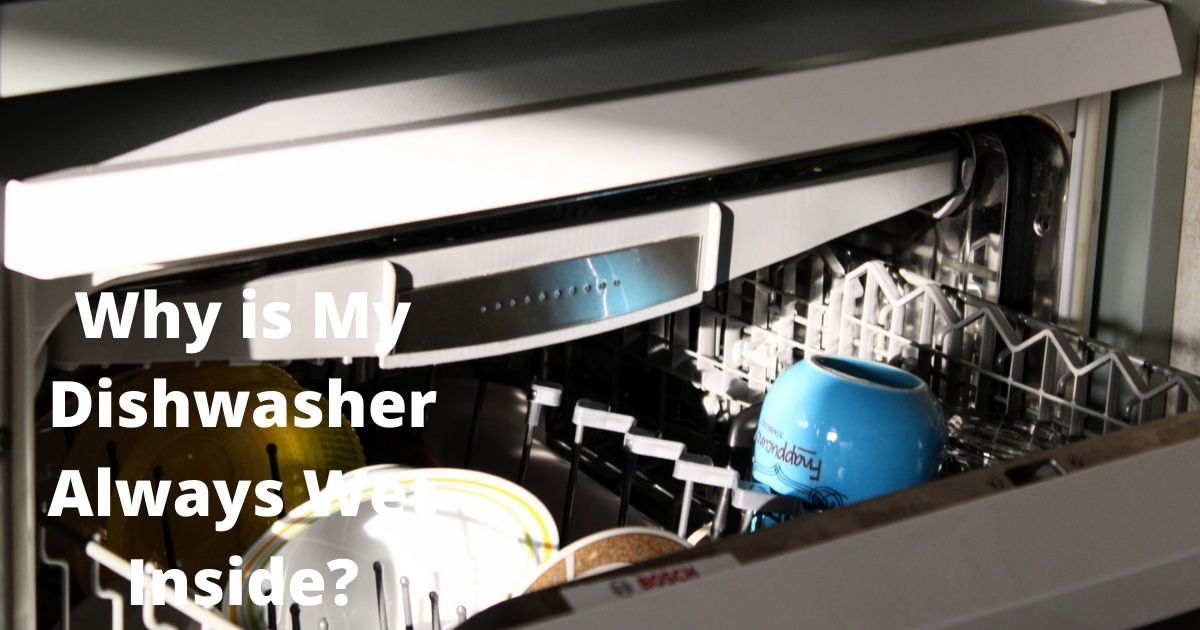Originally Created on: May 7, 2022 @ 8:12 am
Why is my dishwasher always wet inside? We’ve all been there at one point or another—you run your dishwasher and it comes out of the cycle wet on the inside, or maybe there’s an odd smell coming from the unit and you can’t figure out why.
You’ve probably wondered for a long time why this could be the case. Of course, dishwashers do need water for it to run effectively, hot water in that matter. But, could that be the only reason why your dishwasher is always wet. Or are there faulty mechanism/parts that you should be aware of.
In this particular, article, we will be diving deeper into this topic in detail. We hope to provide you with the right answers at the end of the day and put this matter to bed once and for all.
Are you ready? Let’s get straight into it!
Table of Content
Why is My Dishwasher Always Wet Inside
There are a number of reasons why your dishwasher is always wet inside. Some of these reasons includes, a faulty heating element, blocked drain hose, blocked drain filter or a case of your dishwasher just not draining water properly after each wash cycle.
In this particular case, we are not referring to your dishwasher being wet during a wash cycle. It just wouldn’t make sense since each wash cycle requires water to run. We are simply looking at
Let’s now dive deeper into each of the reasons why your dishwasher is always wet inside.
Reasons Why Dishwasher Might be Wet Inside
There are several reasons your dishwasher might be wet inside, and below are the key reasons why your dishwasher might be wet inside.
a) Faulty Heating Element
Your dishwasher’s heating element may be faulty, causing water to leak out of your dishwasher machine. This will end up leaving your dishwasher wet inside even after a wash cycle. To repair this, you’ll need to reach out to your local repairman to fix or replace the heating element for you.
b) Dishwasher Not Draining
If your dishwasher doesn’t drain properly, water will pool in it and overflow when you open it. Check your drain hose to make sure there are no kinks or holes that would prevent water from flowing out of your home. We recommend engaging your repairman to ensure no further damage to your dishwasher.
c) Blocked Drain Hose
In case your drain hose is blocked, it could back up and cause water to spill into your dishwasher. Once you’ve cleared any kinks in your drain hose, you should be able to use your dishwasher again.
d) Blocked Drain Filter
When your drain filter is blocked, water won’t be able to drain properly, and your dishwasher will fill up with dirty water. Clean your drain filter regularly to keep it functioning smoothly.
You May Also Like: Why Does My New Dishwasher Have Water in It
Should The Dishwasher be Wet Inside After The Cycle?
It’s normal for your dishwasher to be a little damp after a cycle. Most dishwashers are designed to leave a small amount of water in them at all times so that if there is an issue with leaks, it won’t flood your kitchen floor.
The water will evaporate quickly, and you can wipe up any excess with a towel or rag before you store dishes away. If you find that there is more than just a small amount of water left in your dishwasher, it could mean that there are problems with leaks or other issues that need attention from an appliance repair professional.
Related: Why isn’t My Dishwasher Drying Dishes? (3 Key Reasons)
How Do I Stop Condensation in My Dishwasher?
Condensation occurs when warm air meets a cold surface. In your kitchen, you can find condensation on glassware, on your refrigerator, and in your dishwasher. You can’t see it or feel it, but at some point, every kitchen appliance will have condensation.
There are several ways to deal with a soggy dishwasher. Here are a few things you can do.
1) Use Dehumidifier
You can prevent condensation from happening altogether by purchasing a dehumidifier. Dehumidifiers remove moisture from your home’s air and can help to keep condensation from developing in your kitchen appliances.
2) Leave it overnight
Another option would be to leave a few dishes out overnight so that they will be slightly warmed when you load them into your dishwasher. This small temperature difference could help prevent condensation from forming on your dishes.
3) Clean It Out
If your dishwasher has been running for several cycles without emptying, you may want to clean it out before using it again. The water that builds up in your machine can cause mildew and mold growth, which can lead to unpleasant odors and health concerns for anyone living with or near your kitchen appliances. To clean it out, simply remove all of its contents and run an empty cycle with one cup of bleach added per gallon of water.
4) Leave a Small Gap When Building Countertops
Using wood instead of tile or metal when building your countertops can also help you to prevent condensation. Wood will absorb more heat from your refrigerator and other appliances, keeping them warmer. You should also make sure that there’s at least one inch of air space between your countertop and appliances. This space can help heat to escape, preventing cold air from hitting your appliances’ cool surfaces and creating condensation.
Editor’s Pick: Why Are My Dishes Sticky After Dishwasher? + 7 Reasons Why
Conclusion
Still wondering why is my dishwasher always wet inside? It’s because there’s a problem with your drain. Most likely, you have a clog in your drain line. This could be caused by food or grease buildup, or it could be caused by an obstruction in your line.
You can fix the problem yourself if you’re willing to take apart your machine and clean out any obstructions that may be causing water to back up into your machine. However, if you don’t feel comfortable doing that yourself, then you can reach out to a professional to come out and take care of it for you.
They will most likely run a snake through your line and use some chemicals to break down any grease or build-up that may be causing problems for you.

